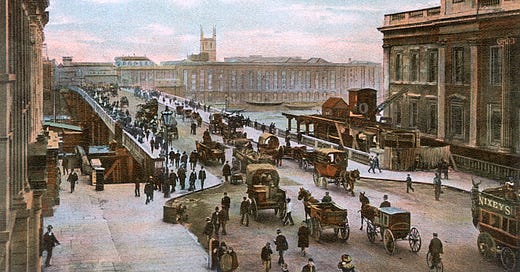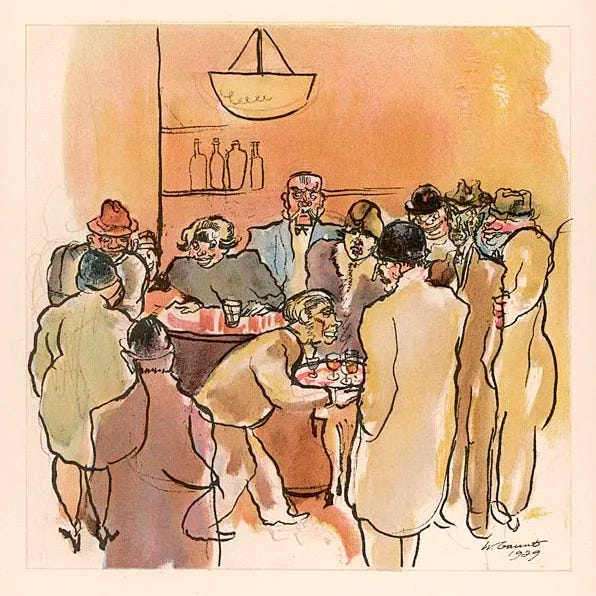Thank you for reading Maynard’s War, and welcome to my new subscribers. Chapter 27 will be published next Sunday, 15th June at 11am UK time. Do please share with anyone you think might be interested - it takes but a click.
If you’ve only just discovered Maynard’s War and would like to start at the beginning, then please click this button:
November 1917
Leonard had lost track of time. He’d been wandering across the downs for several hours. What sun there had been was now hidden behind milky clouds just above the horizon. He knew he should be getting back, but for once Virginia would have to wait.
He came upon the bench he’d been looking for and sat down. It was cold but there was no wind. He could hear the guns across the channel. More poor souls taking a battering.
That morning, after three of the longest years of his life, the war had finally caught up with him. A telegram had brought the dreadful news that his brother Cecil had been killed. Their brother Philip had been seriously wounded in the same incident.
Cecil and Philip were the youngest of his eight brothers and sisters, born two years apart, but inseparable all their lives. He’d only seen such unconsidered sibling devotion in twins, but Cecil and Philip had, even as young adults before the war, spent as much time together as they could.
They had joined up together at the outbreak of war, and, from their copious correspondence, Leonard had learned that they had been comrades in arms throughout. It seemed appropriate that if one of them had to die they should be together when it happened, and Leonard found some comfort in this, but the overwhelming sensation was of numbness.
His enquiries had established that Philip’s life was not in danger and that he would be arriving in London the following morning. He’d been given the names of four hospitals to which he could possibly be admitted. He would visit each until he found his brother, and then he would visit his mother.
The following morning he struck lucky. After a couple of telephone calls he learned that Philip was being treated at the Red Cross Hospital for Officers which occupied the Fishmongers’ Hall, on the north side of London Bridge. Visitors were allowed for afternoon tea, which made everything sound far more civilised than the reality Leonard imagined he would find on arrival.
He had visited the Fishmongers’ Hall with Virginia before the war and remembered the late-Georgian beauty of its gilded ceiling. On arrival, he was amazed at the sensitivity with which the building had been converted for use as a military hospital. In the Great Hall, the magnificent ceiling was still visible. The room had been divided with partition walls to create smaller rooms each with two beds, some of which had a view of the river.
It was in the third of these that he found Philip. He was shocked at his brother’s appearance. He had a haunted look, the like of which he had only ever seen on Virginia’s face at the height of her illness. Leonard picked up a chair from the far wall and placed it close to the bed. Philip, who had been awake throughout, but had appeared not to notice Leonard enter the room, looked at him for the first time, and smiled for a moment.
Leonard had no idea how to begin. He wanted to ask his brother how he was feeling but the question felt utterly banal. He picked up Philip’s hand and held it in his. “I’m so very sorry,” he said, eventually. As he spoke he noticed a solitary tear escape from Philip’s left eye.
“I miss him so much.”
“I can’t begin to imagine how you must be feeling,” Leonard said, after a moment. “Neither can I promise that it will get better. But we are all here, and we’ll do whatever we can to help you through this.”
They sat in silence for several minutes, gazing out across the grey, dreary Thames. Eventually Philip spoke. “We thought the war would be an opportunity to do something that would make a difference, have a positive impact on the world. Something we could be proud of.”
“You can be proud of what you did, Philip. Whatever one thinks of the war, the sacrifices made by you and Cecil, and the thousands of others who have fallen, stand for what they are. Examples of the most exceptional forbearance and heroism of which men are capable. A century from now there will be grand events to commemorate your sacrifice.”
“But will any of it have made a difference, do you think?” Philip was suddenly engaged, the slough of depression temporarily lifted.
“That rather depends on whether we win the war. Although with the Americans now on board, that does seem like a more realistic prospect. If you and Cecil hadn’t been there to resist the enemy it may have been over years ago. And who knows where we would be now?”
“Perhaps Cecil would still be alive?”
“Do you want to tell me what happened?”
“We’d been under bombardment for days. There was no point launching an attack, we would have been decimated. After a while you stop feeling afraid, but the noise, the continual explosions all around, that’s what drives people mad. And it had become unbearable. Morale among the men was dreadfully low. Then there was a lull in the shelling. The Germans usually took a tea break after a few hours of heavy bombardment, so our C.O. decided to take a leaf out of his officers’ manual: he climbed up on to the parapet and started strutting along the line. Senior officers often do this when they feel morale needs a boost. The men cheer and shout. The officers think they are shouting in support and admiration. Of course, they’re not, though the exercise does tend to lift spirits for a while.”
“And then a mortar landed right next to him, just above Cecil and me. We could see him over the parapet, badly wounded, but conscious. We didn’t think for a moment. We’d served under the man for two years, we couldn’t leave him there. So up we went. We had him, an arm over each of our shoulders, and then we heard the next mortar. Cecil and the Major died instantly. I’ll spare you the details. I don’t know how I survived. I must have been shielded by their bodies. Funny isn’t it,” he looked at Leonard, “it was always me getting Cecil out of scrapes when we were children. Perhaps this was his way of repaying me. Only I wish he’d taken me with him. I can’t bear the thought of never seeing him again.”
They sat in silence again, Leonard eventually deciding to change the subject. “Tell me about your injuries. How long will you be here? It’s an easy trip in from Richmond, so I can come and visit you every day. I might even bring Virginia.”
“Bloody doctor I saw yesterday told me I’d be back in France for Christmas. Although once he was gone, matron told me to pay no notice, and said I wouldn’t be fit to return to active duty until Easter.”
“So you’ll definitely be going back?”
“I have no choice. I sold myself to the army, body and soul. I only hope I can stay alive long enough to have both returned to me.”
He leant forward and asked Leonard to place another pillow behind his back so he could sit up and talk more comfortably. “Now tell me,” he said, grimacing as he struggled to move his body up the bed, “How is mother?”
Thanks for reading Maynard’s War. Subscribe for free to ensure you never miss a chapter. Or take out a paid subscription and help me to deliver chapters on time.
And if you’re interested in all things Bloomsbury, and specifically 20th century British art, do check out Victoria K. Walker’s Beyond Bloomsbury. It’s fabulous.






